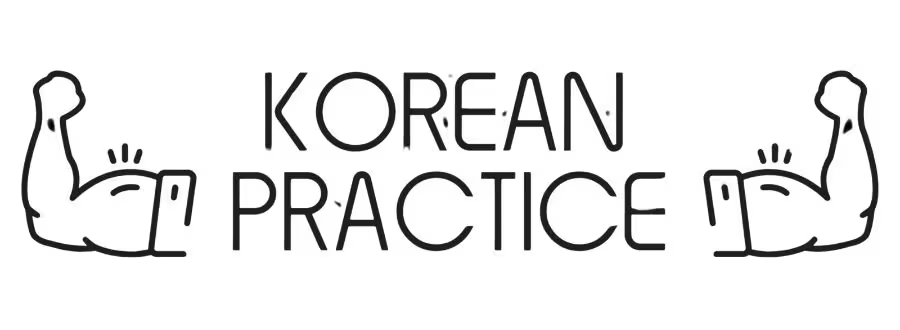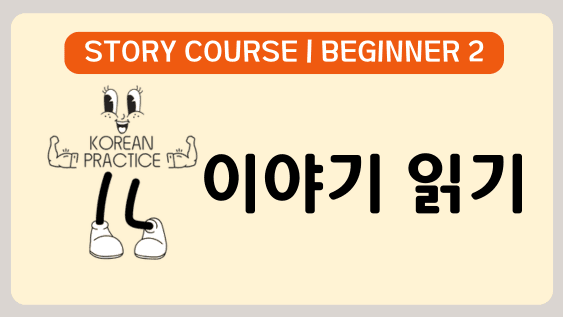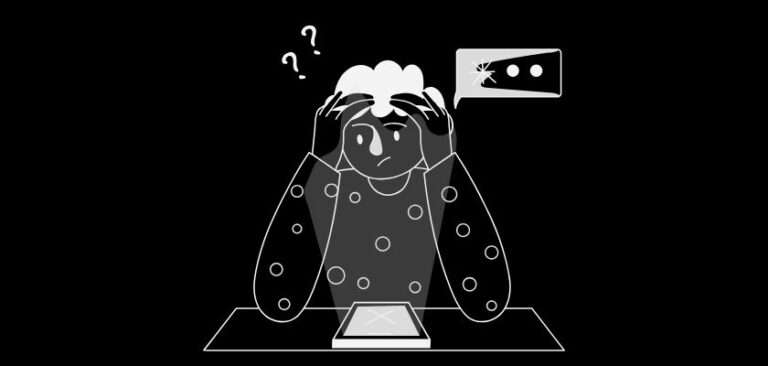장을 보다 Meaning in English
The Korean expression 장을 보다 translates to “grocery shopping” in English. Literally, it combines 장 (market or grocery) and 보다 (to see, look, or do), forming a phrase that means “to do the groceries” or “to go grocery shopping.”
This phrase is commonly used in everyday life and applies to the act of shopping for food and household items, usually in traditional markets, supermarkets, or convenience stores. Whether you’re planning a Korean BBQ feast or just grabbing some essentials, 장을 보다 is an essential verb for Korean daily life!
But that’s just the beginning—there are other ways Koreans say yes and no depending on the situation. Keep scrolling to explore 8 easy examples with full explanations.
Follow These Steps
Step 1: Listen & Shadow
Follow the audio and speak along with the highlighted text.
Step 2: Check & Learn
Use the breakdowns to understand grammar, vocab, and meaning.
Step 3: Review Visually
Watch the reading practice video to reinforce the story.
Go Deeper
Get the full story and extra practice in the paid course.
STEP 1
Click the play button to try shadowing below.
Tip: For the best, distraction-free experience, switch to fullscreen mode while shadowing.
Table of Contents

STEP 2
장을 보다 Nuances and Usage
The phrase 장을 보다 meaning in English emphasizes a routine activity, often implying preparation for meals or household needs. It’s versatile and can be used in various contexts, such as discussing chores, meal planning, or simply a casual conversation about one’s day.
In modern usage, while traditional markets still hold a special place in Korean culture, 장을 보다 is just as applicable when referring to shopping at supermarkets like E-Mart or Costco.
Additionally, the verb 보다 is conjugated based on tense and politeness levels, making it adaptable for different situations:
- 장을 봅니다 (formal)
- 장을 봐요 (polite)
- 장을 봐 (casual)
Example Sentences:
Original Korean Sentence
주말마다 가족과 함께 장을 보러 가요.
Pronunciation Guide
주말마다 (ju-mal-ma-da) 가족꽈 (ga-jok-ggwa) 함께 (ham-gge) 장을 (jang-eul) 보러 (bo-reo) 가요 (ga-yo).
Meaning and Context
주말 (weekend) 마다 (every) 가족 (family) 과 (with; used with words ending in consonants) 함께 (together) 장을 보러 가요 (go grocery shopping): 장 (market/groceries) + 을 (object particle) + 보 (to see/shop) + 러 (in order to) 가 (to go) 아요 (I’m telling you polite and friendly).
English Translation
Every weekend, I go grocery shopping with my family.
Literal Translation
Every weekend, with family, (I) go to see market.
✍️ Related: Do You Speak English in Korean? 9 Easy Ways to Ask (With Examples)
Example Sentences:
Original Korean Sentence
파티 준비 때문에 아침 일찍 장을 보러 갔어요.
Pronunciation Guide
파티 (pa-ti) 준비 (jun-bi) 때문에 (ttae-mun-e) 아침 (a-chim) 일찍 (il-jjik) 장을 (jang-eul) 보러 (bo-reo) 갓써요 (gat-sseo-yo).
Meaning and Context
파티 (party) 준비 (preparation) 때문에 (because of) 아침 (morning) 일찍 (early) 장을 보러 갔어요 (went grocery shopping): 장 (market/groceries) + 을 (object particle) + 보다 (to see/shop) + 러 (in order to) 가다 (to go) + 았 (past tense) 어요 (I’m telling you polite and friendly).
English Translation
Because of the party preparation, I went grocery shopping early in the morning.
Literal Translation
Because of party preparation, early morning, (I) went to see market.
✍️ Related: Did You Eat in Korean? Why This Greeting Means More Than Food
Example Sentences:
Original Korean Sentence
오늘 저녁 먹을 재료를 사려고 장을 봤어.
Pronunciation Guide
오늘 (o-neul) 저녁 (jeo-nyeok) 머글 (meo-geul) 재료를 (jae-ryo-reul) 사려고 (sa-ryeo-go) 장을 (jang-eul) 봣써 (bwat-sseo).
Meaning and Context
오늘 (today) 저녁 (dinner) 먹 (to eat) 을 (that I will) 재료 (ingredients) 사 (to buy) 려고 (in order to) 장을 봤어 (went grocery shopping): 장 (market/groceries) + 보다 (to see, but also used for shopping) + 았 (past tense) 어 (I’m telling you casually).
English Translation
I went grocery shopping to buy ingredients for tonight’s dinner.
Literal Translation
In order to buy dinner ingredients that I will eat, (I) saw market.
✍️ Related: I See in Korean: 3 Real Phrases Koreans Use (Not Just ‘그렇구나’!)
STEP 3
Watch this short story video to see 장을 보다 in action
From My Original Story Style Breakdown™ — A New Way to Truly Understand Korean
This is just one sentence from a complete learning system you won’t find anywhere else — designed to help you understand Korean naturally, without getting lost in grammar rules. You can choose between Quick Learning for a fast overview, or Deep Learning for a step-by-step breakdown.
When you can truly understand Korean sentences this way, speaking becomes much easier.
🚀 Quick Learning

Original Korean Sentence
사자가 코끼리를 잡아요.
Pronunciation Guide
사자가 (sa-ja-ga) 코끼리를 (ko-ggi-ri-reul) 자바요 (ja-ba-yo).
English Translation
The lion catches the elephant.
Literal Translation
Lion catch elephant.
Quick Reference
사자가 (lion) 코끼리를 (elephant) 잡아요 (catch).
💡 Need more details? See “Deep Learning” below!
🔍 Deep Learning
Meaning and Context
사자 (lion)
→ The lion — the one taking action now in the story.
가 (subject marker)
→ Points out that the lion is doing the action.
코끼리 (elephant)
→ The one the action is done to.
를 (object marker)
→ Shows that the elephant is the object being caught.
잡 (to catch, grab, take)
→ The action — the lion catches or grabs the elephant.
아요 (polite ending)
→ I’m telling you this in a polite and friendly way.
Real-Life Usage
잡아요 is common when talking about catching or holding something.
Pattern Practice
1. 사자가 토끼를 잡아요.
2. 고양이가 쥐를 잡아요.
3. 아이가 공을 잡아요.
4. 강아지가 공을 잡았어요.
FAQs (What You Might Still Wonder About)
Is 장을 보다 only used for grocery shopping, or can it mean other types of shopping too?
While 장을 보다 meaning is most commonly “to go grocery shopping,” it can also refer to buying household essentials or ingredients for cooking. However, it’s not usually used for shopping for clothes or electronics. For that, Koreans use 쇼핑하다 (shoppinghada).
What is the difference between 장 and 시장 in Korean?
If you’re wondering 장 meaning in English, it can mean “market” or “groceries.” Meanwhile, 시장 (sijang) specifically means a marketplace. So 장을 보다 translate literally is “to see/visit the market,” while 시장을 보다 can also be used, especially when referring to a traditional market.
Can I say 장을 사다 instead of 장을 보다?
No—Koreans don’t say 장을 사다 because it sounds unnatural. The phrase 장을 보다 has become a fixed expression. If you directly translate it as “to see the market,” you might get confused, but remember, what is the meaning of 장을 보다? It’s simply “to do grocery shopping,” not “to literally see the market.”
How do you conjugate 장을 보다 in different tenses?
Here’s a quick 장을 보다 example in three tenses:
Present polite: 장을 봐요 (I’m doing grocery shopping)
Past casual: 장을 봤어 (I did grocery shopping)
Future formal: 장을 볼 거예요 (I will go grocery shopping)
Notice how 보다 changes just like any other Korean verb.
Is 장을 보다 still used in modern Korea, or is it old-fashioned?
Even today, 장을 보다 meaning remains very common. Whether you’re buying ingredients at a traditional market, a convenience store, or Costco, Koreans still say 장을 보다 naturally. It’s not an outdated phrase—so you’ll hear it a lot in daily conversations and K-dramas.
Can 장을 보다 be used figuratively, like preparing for something?
Yes! Sometimes it’s used a bit more broadly. For example, when preparing for a big event like 추석 (Chuseok) or a wedding, people might say 이번 주말엔 잔뜩 장을 봐야 해 (I have to do a LOT of grocery shopping this weekend). It still relates to shopping, but implies preparation rather than just a quick trip to the store.
Final words
Understanding 장을 보다 meaning in English is a great way to expand your vocabulary and connect with everyday Korean culture. Whether you’re living in Korea or simply enjoying K-dramas and Korean food, mastering phrases like this makes your Korean journey more relatable and fun.
Learning Korean through practical examples like 장을 보다 is helpful, but imagine understanding these phrases naturally through stories! Check out my Story Courses to make learning Korean engaging, easy, and unforgettable.
What do you usually buy when you 장을 보다? Share your grocery shopping stories in the comments below!








